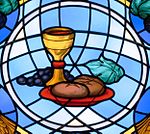
Back أصول الإفخارستيا Arabic Origen de la Eucaristía Spanish Orígine del Eucaristie IE Ustanowienie Eucharystii Polish

| Part of a series on the |
| Eucharist |
|---|
 |
Some Christian denominations[1][2][3] place the origin of the Eucharist in the Last Supper of Jesus with his disciples, at which he is believed[4] to have taken bread and given it to his disciples, telling them to eat of it, because it was his body, and to have taken a cup and given it to his disciples, telling them to drink of it because it was the cup of the covenant in his blood.[5]
The earliest extant written account of a Christian eucharistia (Greek for 'thanksgiving') is that in the First Epistle to the Corinthians (around AD 55),[6] in which Paul the Apostle relates "eating the bread and drinking the cup of the Lord" in the celebration of a "Supper of the Lord" to the Last Supper of Jesus some 25 years earlier.[7] Paul considers that in celebrating the rite they were fulfilling a mandate to do so.[8] The Acts of the Apostles presents the early Christians as meeting for "the breaking of bread" as some sort of ceremony.[9]
Writing around the middle of the second century, Justin Martyr gives the oldest descriptions of something that can be recognised as the rite that is in use today, according to K.W. Noakes.[10] Earlier sources, such as the Didache, 1 Clement and Ignatius of Antioch provide glimpses of what Christians were doing in their Eucharists. Later sources, Tertullian and the Apostolic Tradition, offer some details from around the year 200.[11] Even before the Church "went public" after the conversion of Constantine the Great in the second decade of the fourth century, it was clear that the Eucharist was a central part of Christian life and worship.[11]
Scholars seeking to understand Christian practice debate whether Jesus meant to institute a ritual at his Last Supper;[12] whether the Last Supper was an actual historical event in any way related to the undisputed early "Lord's Supper" or "Eucharist"[13] and have asked if the Eucharist had its origins in a pagan context, where dinners to memorialize the dead were common.
- ^ Catechism of the Catholic Church, "The institution of the Eucharist"
- ^ John Anthony McGuckin, The Encyclopedia of Eastern Orthodox Christianity (Wiley-Blackwell 2011 ISBN 978-1405185394), Eucharist article by MC Steenberg vol. 1, p. 231
- ^ Colin Buchanan, The A to Z of Anglicanism (Scarecrow Press 2009 ISBN 978-0810868427), p. 107
- ^ Tabor, James (2013-07-17). "Did Jesus Really Say That". Huffington Post. Archived from the original on 2020-03-24. Retrieved 2020-03-24.
- ^ Enrico Mazza, Celebration of the Eucharist: The Origin of the Rite and the Development of Its Interpretation (Liturgical Press 1999 ISBN 978-0814661703), p. 19 Quotation concerning the origin: "The Christian Eucharist has its origin in the Last Supper. There, Jesus took bread, blessed God, broke the bread, and gave it to his disciples, telling them to take it and eat of it, because it was his body. In the same way, after they had eaten, he took the cup, gave thanks, and gave it to his disciples, telling them all to take it and drink of it, because it was the cup of the covenant in his blood as redemption of sin for many (Matthew 26:26–28). At the end he said: "Do this in remembrance of me."
- ^ Murphy-O'Connor, Jerome (1996). "The First Letter to the Corinthians". In Raymond E. Brown; Joseph A. Fitzmyer; Roland E. Murphy (eds.). The New Jerome Biblical Commentary. Englewood Cliffs, New Jersey: Prentice Hall. p. 799. ISBN 0136149340.. See also First Epistle to the Corinthians#Time and Place[broken anchor]
- ^ 1 Corinthians 11:17–34
- ^ Encyclopædia Britannica, s.v. Eucharist
- ^ Dix, dom Gregory (1949), The Shape of the Liturgy, London: DacrePress, p. 63
- ^ Noakes, K.W. (1979), "The Eucharist: 2 From the Apostolic Fathers to Irenaeus", in Jones, Cheslyn (ed.), The Study of Liturgy, London: SPCK, pp. 171ff
- ^ a b Wainwright, Geoffrey (1979), "General Introduction: 1 The Periods of Liturgical History", in Jones, Cheslyn (ed.), The Study of Liturgy, London: SPCK, p. 35
- ^ Crossan, John Dominic, The Historical Jesus, pp. 360–367
- ^ Bradshaw, Paul, Eucharistic Origins (London, SPCK, 2004) ISBN 0281056153, p. 10.